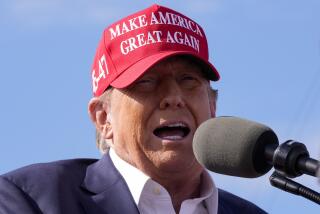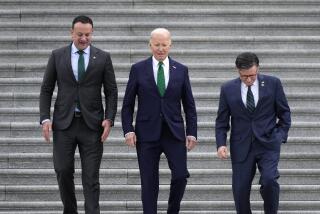Bush Will Pass Up Matching Funds
WASHINGTON — Flush with cash, Texas Gov. George W. Bush announced Thursday he will forgo federal matching funds as newly released campaign reports showed some of his Republican presidential rivals in financial straits.
The Democratic matchup, meanwhile, appeared to grow even more competitive, as Vice President Al Gore reported $11.2 million in cash on hand, compared with $7.5 million for former Sen. Bill Bradley, according to midyear Federal Election Commission filings. This financial gap is even narrower than their overall fund-raising totals for this year: Through June 30, Gore raised about $7.8 million more than Bradley.
Bush’s decision to reject public financing could give him a crucial advantage in the primaries early next year because it means he can avoid state-by-state spending limits. For instance, candidates who accept the matching money from the federal government can use no more than $661,000 of their contributions in New Hampshire; Bush will be able to spend as much as he wants in his bid to win the state’s first-in-the-nation primary.
“You’ve got limits that constrain a candidate,” Bush said as he campaigned in Iowa. “I want to be in a position to respond.”
Most important, the flexibility enables Bush to potentially spend more than Steve Forbes, the publishing magnate who unleashed his personal wealth on Republican Bob Dole four years ago--to the tune of $40 million--and is preparing to do the same to Bush.
Bush will have the resources to strike back. “If Forbes were to come out with an ad on Tuesday night that said George Bush eats worms, by Wednesday night Bush would have a worm testifying it’s not true,” said Charlie Black, a campaign advisor to the Texan.
Matching funds come from the optional $3 checkoff on federal income tax forms. Candidates who receive sufficient financial support from around the country qualify for this public subsidy, which supplements their campaign coffers. In forgoing the taxpayer support, Bush is banking on the hope that he can boost the record $37 million he raised through June 30 to more than $50 million by year’s end.
If he were to abide by the limits, he would be allowed to spend only $40 million on his campaign.
Unless funds suddenly dry up, that $50-million goal should be a breeze. On Wednesday alone, Bush swung through Maryland and Virgina and raised $1.9 million--about as much as some rivals have collected so far this year.
A review of the FEC data conducted for The Times and CNN by the nonpartisan Campaign Study Group shows that more than half of Bush’s donations during the first six months of 1999 came from just three states: Texas (31.5%), California (11.6%) and Florida (8.4%).
The average contribution to the Bush campaign was $466.69, but the vast majority of donors gave the maximum $1,000. In contrast, Gore’s average contribution was $114.
Bush received $57,350 from residents of Hong Kong--which is legal as long as the givers are U.S. citizens--a sum that exceeded GOP rival Elizabeth Hanford Dole’s take in 37 states.
Other highlights from the reports, which flesh out figures released two weeks ago:
* Most of the 10-candidate Republican field lacks the resources to participate in the spending spree between Bush and Forbes. Particularly troublesome for some candidates was cash on hand. Former Vice President Dan Quayle reported $129,000 cash on hand, along with debts totaling roughly $629,000.
* Forbes also reported more debts than receipts, but he can keep his campaign solvent with personal checks. Already, Forbes has pumped $6.6 million of his own money into the contest.
* Just over a third of Bradley’s contributions came from just three states--New York, New Jersey and Connecticut--where many voters would have followed his career as a New York Knicks basketball star. He also represented New Jersey for three terms in the Senate.
* Bradley’s ability to raise $11.7 million in the first half of the year--and conserve the vast majority of it--contrasts with Gore’s campaign, which spent more than $8 million of his $19.5-million take.
“This continues the concern that the vice president’s campaign is not all that steady,” said one Democratic strategist, noting the heavier overhead of Gore’s operation.
The Gore campaign, however, said it is pleased with its financial position. “We’ve hit our goals; we’re on our plan and on our budget,” said spokeswoman Kiki Moore.
Although the shortened primary season has increased the importance of early fund-raising, history has also shown money is not always decisive. In 1996, Sen. Phil Gramm (R-Texas) raised $21.3 million--second best in a nine-man GOP field--but ended up one of the first candidates to drop out.
“The money gets [candidates] to the point where they can make their views known to the electorate,” said Anthony Corrado, a campaign finance expert at Maine’s Colby College. “The ultimate question is whether the voters find those views acceptable.”
Naturally, Bush’s rivals are hoping message can trump money. “The game is not how much we’ve raised or how much cash we have on hand, but ideas, and we think we’re rich in that currency,” said Quayle spokesman Jonathan Baron.
The rest of the Republican pack was quick to accuse Bush of trying to buy the nomination. “Some in our party don’t want the voters to have a say in picking our nominee,” Lamar Alexander said in Iowa.
Sen. John McCain (R-Ariz.), who has focused on campaign reform, said Bush “may be unintentionally adding to the already widespread cynicism of the American people regarding the influence of special-interest money in politics.”
Bush’s decision to forgo matching funds and avoid federal constraints could have the most dramatic effect in the early-voting states of Iowa and New Hampshire. The spending caps are based on voting-age population; in California, even Bush and Forbes would be hard-pressed to spend the full $12.5 million allowed.
But even relatively poor candidates can quickly find themselves pushing against the limits in Iowa--with a $1.1-million ceiling--and New Hampshire’s limit.
Bush’s decision also could increase the likelihood of future candidates bypassing the system of presidential campaign spending limits instituted after the Watergate scandal.
*
Times political writers Ronald Brownstein and Cathleen Decker contributed to this story.
Updated news and archived coverage of the 2000 presidential race is available on The Times’ Web site: http://161.35.110.226/elect2000
(BEGIN TEXT OF INFOBOX / INFOGRAPHIC)
Campaign Funds Tally
New figures submitted to the Federal Election Commission offer a more detailed breakdown of campaign contributions raised--and spent--in the first half of 1999. Complete figures from Lamar Alexander, Gary Bauer, Patrick J. Buchanan, Steve Forbes, Sen. Orrin G. Hatch and Alan Keyes were unavailable. Figures don’t include some miscellaneous costs and therefore may not add up.
More to Read
Get the L.A. Times Politics newsletter
Deeply reported insights into legislation, politics and policy from Sacramento, Washington and beyond. In your inbox three times per week.
You may occasionally receive promotional content from the Los Angeles Times.











